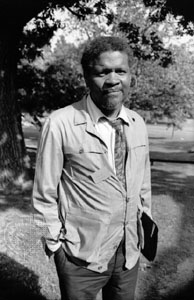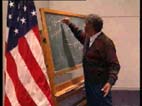
BACK to our main Reed page
|
|
BACK to our main Reed page |
![]()
Ishmael Reed, together with Toni Morrison, is one of today's pre-eminent African American literary figures--perhaps the most widely reviewed since Ralph Ellison, and, along with Samuel Delany and Amiri Baraka, probably the most controversial.
-Ishmael Reed began writing his own jazz column for Empire State, a weekly African American newspaper in Buffalo, NY
Post Open in 192. Since the publication of his first novel, The Free-Lance Pallbearers, in 1967, Reed has thus far produced seven novels, four books of poetry, two collections of essays, numerous reviews and critical articles, and has edited two major anthologies. Reed's literary style is best known for its use of parody and satire in attempts to create new myths and to challenge the formal conventions of literary tradition. Reed's works have alternately been criticized as incoherent, muddled, and abstruse, and hailed as multicultural, revolutionary, vivid, and containing a deep awareness of mythic archetypes.
Born 1938 in Chattanooga, Tennessee, Ishmael Reed grew up in working class neighborhoods in Buffalo, New York. He attended Buffalo public schools and the University of Buffalo. He moved to New York City,where he cofounded the East Village Other (1965), an underground newspaper that achieved a national reputation. Also that year he organized the American Festival of Negro Art. As well as being a novelist, poet, and essayist, he is a songwriter, television producer, publisher, magazine editor, playwright, and founder of the Before Columbus Foundation and There City Cinema, both of which are located in northern California. He has taught at Harvard, Yale, and Dartmouth, and for twenty years he has been a lecturer at the University of California at Berkeley, He lives in Oakland, California.

Since the publication of his first novel, The Free-Lance Pallbearers (1967), Reed has devoted himself to the production of a substantial body of literature - fiction, poetry and essays - which has as its consistent objective the satirizing of American political, religious and literary repression. His literary subversion has expressed itself in parodies of political realities: the racism and greed of the Reagan era in The Terrible Twos (1982) and the recent Japanese by Spring (1993), fundamentalist Christian white supremacist values in The Terrible Threes (1989) and parodies of literary forms themselves, western pulp novels in Yellow Back Radio Broke-Down (1969), slave narratives in Flight To Canada (1976), and detective fiction in Mumbo Jumbo (1972) which pits proponents of rationalism and militarism against believers in the magical and intuitive, The Last Days of Louisiana Red (1974). (complete bibliography below).
Mumbo Jumbo (1972) was the work that first achieved wide notoriety for the author, and it is considered by several scholars to be his best, along with Flight to Canada (1976). Two of Reed's books have been nominated for National Book Awards, and he has received numerous honors, fellowships, and prizes, including the Lewis H. Michaux Literary Prize, awarded to him in 1978 by the Studio Museum in Harlem.
![]()
The Freelance Pallbearers , 1967. Bukka Doopeyduk launches a rebellion in the miserable nation of Harry Sam, ruled by the despotic Harry Sam
Yellow Back Radio Broke-Down ,1969. a black circus cowboy with cloven hooves, the Loop Garoo Kid, is the hero
Mumbo Jumbo , 1972. pits proponents of rationalism and militarism against believers in the magical and intuitive
Neo-HooDoo Manifesto , 1972.
Conjure: Selected Poems , 1963-1970 (1972).
Chattanooga: Poems , 1973.
The Last Days of Louisiana Red ,1974. is a fantastic novel set amid the racial violence of Berkeley, Calif., in the 1960s
Flight to Canada , 1976.
Secretary to the Spirits , 1978. Poems.
Shrovetide in Old New Orleans: Essays, 1978.
The Terrible Twos , 1982.
God Made Alaska for the Indians: Selected Essays, 1982.
Reckless Eyeballing , 1986.
New and Collected Poetry ,1988.
Writing is Fighting: Thirty-Seven Years of Boxing on Paper , 1988.
The Terrible Threes , 1989 sequel to The Terrible Twos
Before Columbus Foundation Fiction Anthology: Selections from the American Book Awards 1980-1990.
Tell My Horse : Voodoo and Life in Haiti and Jamaica. 1990(?)
Airing Dirty Laundry , 1993.
Japanese by Spring , 1993.
Conversations with Ishmael Reed. Edited by Amritjit Singh and Bruce Dick. Mississippi, 1995.
African-American Literature: A Brief Introduction & Anthology. Ishmael Reed and Al Young
Asian-American Literature: A Brief Introduction & Anthology. Ishmael Reed and Shawn Wong. Literary Criticism & Essays : History & Criticism - American - Asian American
Hispanic-American Literature: A Brief Introduction & Anthology. Ishmael Reed and Nicollas Kanellos
![]()
Reed's poetry volumes are Catechism of D Neoamerican Hoodoo Church, A Secretary to the Spirits, Chattanooga, Conjure, and New & Collected Poems.
Two albums of his songs, Conjure I: Music for the Texts of Ishmael Reed and Conjure II: Cab Calloway Stands in for the Moon have been released by Pangaea Records. His works include three collections of essays, Writin' is Fightin', God Made Alaska for the Indians, Shrovetide in New Orleans.
![]()
Personal Problems (1981) Running Time: 140:00
Dubbed a black soap opera, Ishmael Reed's Personal Problems challenges not only the way African Americans are imaged, but also restructures a genre that was created by main-stream TV networks. Although Reed describes the work as Ra, look at the triteness of everyday life in middle-class America, it is more than a glance at triteness. This ironic and unsentimental portrait is an alternative take on the customary character laundering in most soaps.
A glimpse into African American life different from those seen in sitcoms such as "The Jeffersons" or the more recent "The Cosby Show," this videotape represents a collaborative effort by African American writers, actors, and crew. Reed further describes the process as a people's forum, [where one gets] all points of view, not just the view of one writer. That's what's left out ofcommercial television different points of view of the lives of other Americans.
Directed by the late Bill Gunn along with Reed,
Personal Problems follows Johnnie Mae Brown (played by
author/ actress Verta Mae Grosvenor), a nurse's
aide, through her dreary hospital workday (a sequence actually
filmed in Harlem Hospital), to her rendezvous with her lover
Raymon along the woodsy shores of the Hudson,
and back home to her unfaithful husband and free-loading relatives.
The audience later witnesses Johnnie Mae's
delicately balanced life collapse dramatically, although her strength
never wanes.
![]()
Jay Boyer, Ishmael Reed. Boise State, 1993.
Metalanguages and Contemporary Authors
The Prolific Jab of Ishmael Reed
John O'Brien, "Ishmael Reed Interview," The New Fiction, Interviews with Innovative American Writers, edited by David Bellamy, 130-41. Urbana: University of Illinois Press, 1974.
Henry Gates, "Ishmael Reed," The Dictionary of Literary Biography 33
![]()